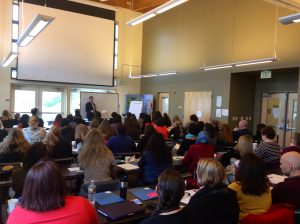 Our 4th annual fall IDEA-Blueprints to Special Education was held on September 13, 2014, 9:30-4:00 at the Shoreline Conference Center.
Our 4th annual fall IDEA-Blueprints to Special Education was held on September 13, 2014, 9:30-4:00 at the Shoreline Conference Center.
Special Education Attorneys Katherine George, Charlotte Cassady and Beth Sigall explained how to use the building blocks of the Individuals with Disabilities Education Act (IDEA) to develop appropriate services for your child or student. The topics included:
 Evaluation Process - How does it get captured in an IEP (what drives services)
Evaluation Process - How does it get captured in an IEP (what drives services)- Eligibility: How is it determined? How old must a child be? Must a child be identified as a certain category to receive services?
- The IEP Meeting: What can I expect? What do all the sections mean? Do we need all these people here? How is it authorized, what do I sign? My IEP is Out of Date, what steps can I take to modify it? Involving the IEP team, each person’s role (funding, training, instructional design, therapy recommendations)
- It feels One Size Fits All- What program types and related services are Available? How to pursue 1:1 support, ABA, OT, Counseling, SLP, Staff training, other related services.
- Understanding FAPE (meeting educational standards) & the LRE; Alternative or private placements
- Aversive Intervention Plans - when is it considered seclusion and restraint? What are my child’s rights? How do I get a safety plan?
- Transition Planning. Do academics stop at 12th grade for a student who is going to school through 21? When does vocational training start, what if all on campus experiences are janitorial? How do I negotiate for meaningful off campus experiences, at what ages can it start?
- Resolving Differences -What are the steps I can take to resolve disputes with the IEP - Letters to a stranger: The teacher is ignoring my child's needs, the principal doesn't know my child, how do I write a letter to a stranger?
After a light lunch Small Group Discussions & breakout sessions were held in the afternoon. (Everyone had an opportunity to participate in all round table discussions.
Group 1 = initial assessments, reevaluations, IEEs
- Evaluation Process In Depth - How does it drive programming? What if the school did a cursory evaluation? What if my child is non-verbal and has challenging behaviors, what if my child is gifted, but has uneven abilities?
- IEE's – When & How do I ask for one?
 Group 2 = IEPs - special education and related services
Group 2 = IEPs - special education and related services
- Effective education - How do I negotiate for research based and evidence based methodology, how much data can I ask for? How often can progress be reported, what if the expectation is REALLY low, how can I negotiate for access to general ed. for a highly impacted student, how can I negotiate for access to the gifted program if my child has social & organization needs?
- How to secure services for high functioning students who don't present with exceptional needs (needs fall through the cracks)
- Transition Plans & Vocational Training
- What does 18-21 look like for higher functioning students - College prep, etc.
 Group 3 = Placement & resolving differences; Due Process
Group 3 = Placement & resolving differences; Due Process
- Placement - Full range of instructional arrangements & supplementary aids & services, how to negotiate for appropriate supports in the least restrictive environment, what if there are no good options in the district, how & when do I negotiate for private placement
- Resolving differences, I can't afford an attorney, my child's been out of school for 4 months! Documentation along the way in case you ever need to duke it out! Where do I begin?
Group 4 = Discipline and aversive interventions
Positive Behavior Supports, safety plans, how to write letters, what information to include.
Please send an email to [email protected] for more details.
Resources and references from the special education training are available at www.washingtonautismadvocacy.org/family
The next IDEA Blueprints to Special Education will be held in March 2015. Please stay tuned.



